A Conversation With John Saul
by Claire E. White
If there's one quality that New York Times bestselling author John Saul has in abundance (other than talent, of course) it's tenacity. After attending several colleges-Antioch, in Ohio, Cerritos, in Norwalk, California, Montana State University and San Francisco State College--variously majoring in anthropology, liberal arts, and theater, he dropped out of school to become a writer.
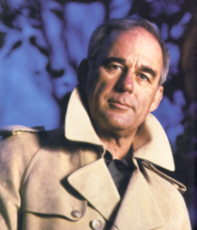
|
Those years garnered him a nice collection of unpublished manuscripts, but not a lot of money. Eventually he found an agent in New York, who spent several years sending his manuscripts around, and trying to make the rejection slips sound hopeful. Then, in 1976, one of his manuscripts reached Dell, who didn't want to buy it, but asked if he'd be interested in writing a psychological thriller. He put together an outline, and crossed his fingers. His agent decided the outline had all the makings of a bestseller, and so did Dell. Gambling on a first novel by an unknown author, in 1977 Dell backed the book with television advertising (one of the first times a paperback original was promoted on television) and the gamble paid off. Within a month Suffer the Children appeared on all the bestseller lists in the country and made the #1 spot in Canada. Subsequently, all 19 of his books have made all the bestseller lists and have been published worldwide. Some of his best-known works include The Presence, Black Lightning, Guardian and The Homing. He is also the author of the New York Times bestselling serial thriller The Blackstone Chronicles, initially published in six installments, but now available in one complete volume. Known for his mastery of dialogue and suspense, he is a perfectionist who believes that writers have to work at their craft and learn the essentials.
In addition to his work as novelist, John is also interested in the theater. He has acted, and as a playwright has had several one-act plays produced in Los Angeles and Seattle, and two optioned in New York. One of his novels was produced by Gerber Productions Company and M.G.M. as a CBS movie and currently two novels are in development. John served on the Expansion Arts Panel of the National Endowment for the Arts. He is actively involved with the development of other writers, and is a lecturer at the Pacific Northwest Writers Conference and the Maui Writers Conference and received the Life Time Achievement Award from the Northwest Writers Conference. John is also a trustee and Vice President of The Chester Woodruff Foundation (New York), a philanthropic organization. John lives part-time in the Pacific Northwest, both in Seattle and in the San Juan Islands. He also maintains a residence on Maui, Hawaii.
A complex man, Saul writes books which terrify millions, yet would much prefer watching Babe to The Exorcist. And he finds his own books absolutely terrifying, especially his latest horror novel, The Right Hand of Evil, which is creeping up the bestseller lists and scaring the pants off reviewers and readers alike. When he's not working or touring, you might spot him walking on the beach at Maui, speaking at a writers' conference or whipping up one of his fabulous seafood specialties. John spoke with us about how he created his latest novel, and gives some great tips for writers trying to break into the market.
I'd like to talk about your latest book, The Right Hand of Evil. What was your inspiration for this book?
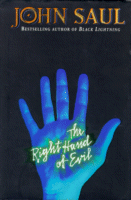
|
You are known for your skill at writing realistic children characters. The voices of the teenaged characters, twins, Jared and Kim, ring especially true. What are your thoughts on creating effective younger characters?
One of the reasons my younger characters are so convincing is because I have total recall of my own childhood. Many of my contemporaries can barely remember incidents from their youth, while I remember exact conversations. Can you imagine what goes on inside my head?
Some of the book's most vivid scenes are those showing the effect of Ted Conway's alcoholism on his family. I found it interesting that Ted's possession (temporarily at least) makes him a much better father and husband! Was that an intentional choice -- or did the nature of Ted's possession just evolve naturally as you wrote the story?
I'm not sure Ted became a better father after he abandoned the bottle. If I were Ted's son I'd rather have him drunk then putting me through the nightmare he put his own kids through after he stopped drinking. Ted's possession was an integral and pivotal part of the plot.
Of the three types of stories you write -- occult/supernatural thrillers, techno-thrillers and psychological thrillers -- which do you find the most challenging to write and why?
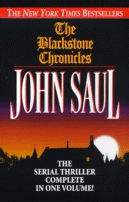
|
You have said before that you don't really enjoy watching scary movies or reading other horror novels. What is it that appeals to you about writing a really frightening story?
Writing a thriller allows me to immerse myself into a story. When I'm writing, the towns and characters are very real to me. I also enjoy the puzzle of putting the plots together. The motivations--the characters--all have to mesh with the plot.
Let's talk about the creative process. What do you need to feel inspired to write in terms of setting, equipment and the like? Or can you write anywhere, anytime?
| "I basically believe organized religion is filled with superstitions. A force, as we define as God, probably does exist, but we mere humans do not have the capability to understand what this force might be." |
Pacing is a crucial element of a great thriller. How do you approach pacing in your books?
I'm not sure I can explain it. When I plot out a book I know what major scenes I would like to incorporate into the story. I also know what twists and turns I'm planning to make. When I write my outline my pacing is geared to those specific touchstones. Sometimes the story glides along to these turning points. Other times I have to alter the scenes and the plot because the characters won't do what I want them to do.
One of the most difficult aspects of the writing life is finding the determination to press on in the face of rejections. What kept you going during the long years between your deciding on writing as a full-time career and the time your first novel was published?
I always figured that those who rejected me didn't know what they were doing. I also allowed my agent to receive my rejection letters, so I could avoid the agony.
Has writing supernatural stories for so many years affected your religious beliefs in any way?
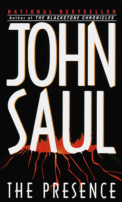
|
What do you like to cook? Do you have any specialties of which you're inordinately proud?
My crab cakes are excellent as is my Crabby-Wabby Casserole (Don't ask!). I cook my steaks to order and I've been told my mahi mahi is better than any dish you can get at a restaurant. As you can see I'm very modest!
What do you love most about spending time in Hawaii?
Here's my list: fabulous beaches, superb weather, great golf, fragrant flowers, crystal clear and temperate water, warm and friendly people, etc., etc.
Describe your idea of the perfect Millennium New Year's Eve celebration.
| "If I waited for my muse I would never produce anything." |
What is your advice to aspiring writers hoping to get published?
Most everyone will have one connection to an editor or agent. When you present your work make sure it's the best representation of what you can do. I do recommend that young writers attend bona fide writers conferences. Often there are agents and editors looking for good material at these events.
What was the greatest challenge you've faced so far in your professional life?
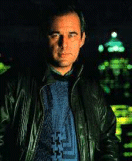 Personally, my greatest challenge has been producing a bestseller
every year while maintaining a relatively calm, normal life style.
I think I've accomplished this. So far I really haven't gone
off the deep end, though a few times it's been close!
Personally, my greatest challenge has been producing a bestseller
every year while maintaining a relatively calm, normal life style.
I think I've accomplished this. So far I really haven't gone
off the deep end, though a few times it's been close!
What would please you most to hear a reader say after he or she has finished one of your books?
Thank goodness I hear it lot: "I really enjoyed your book. Once I picked it up I couldn't put it down." I never get tired of hearing that.
Return to the September 1999 issue of The IWJ.
More from Writers Write
